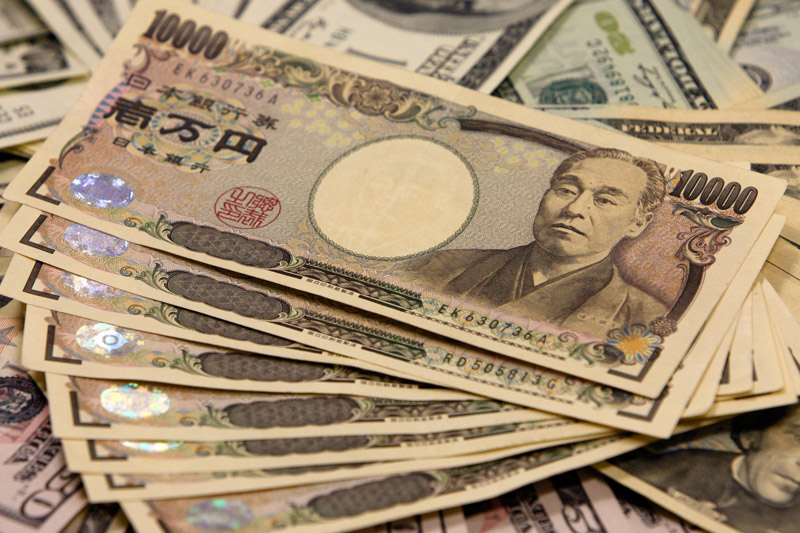Investing.com - The broadly weaker yen was down against its major counterparts on Thursday, amid expectations for more aggressive monetary stimulus from the Bank of Japan following the approval of Shinzo Abe as the country’s prime minister.
During early U.S. morning trade, the yen was down against the U.S. dollar, with USD/JPY climbing 0.16% to hit 85.77, the strongest level since September 2010.
Shinzo Abe was formally approved as Japan’s prime minister by the lower house of parliament on Wednesday. Abe has recently called for unlimited easing by the Bank of Japan in order to weaken the local currency and spur growth in the recession-hit economy.
Earlier Thursday, new Finance Minister Taro Aso said that Abe has ordered him to compile a stimulus package without adhering to a previously agreed cap on new bond issuance, while new Economics Minister Akira Amari said the yen was heading toward appropriate levels with its recent weakening, and that it was important to maintain the downward trend.
The yen was also lower against the euro and the pound, with EUR/JPY gaining 0.5% to hit 113.79, the highest since August 2011 and GBP/JPY up 0.52% to trade at 138.87.
Elsewhere, the Japanese currency declined against the risk-sensitive Canadian, Australian and New Zealand dollars, with CAD/JPY adding 0.44% to hit 86.49, AUD/JPY climbing 0.2% to hit 89.03 and NZD/JPY rising 0.31% to hit 70.39.
Market players remained focused on developments surrounding the fiscal cliff in the U.S., approximately USD600 billion in automatic tax hikes and spending cuts due to come into effect on January 1.
President Barack Obama was to end his vacation and return to Washington on Thursday in order to take part in talks to avert the crisis ahead of the year-end deadline. Both chambers of Congress are also due to return to work on Thursday.
Without a deal, the U.S. could fall back into recession and drag much of the world down with it.
In addition, U.S. Treasury Secretary Tim Geithner said Wednesday that the USD16.4 trillion debt ceiling limit will be hit on December 31. Geithner added that "accounting measures" will be taken to create "headroom" in order to delay a technical violation.
The temporary moves would create USD200 billion in “headroom,” enough to last for approximately two months under normal circumstances.
Later Thursday, the U.S. was to publish its weekly government report on initial jobless claims, as well as data on new home sales and consumer confidence.
During early U.S. morning trade, the yen was down against the U.S. dollar, with USD/JPY climbing 0.16% to hit 85.77, the strongest level since September 2010.
Shinzo Abe was formally approved as Japan’s prime minister by the lower house of parliament on Wednesday. Abe has recently called for unlimited easing by the Bank of Japan in order to weaken the local currency and spur growth in the recession-hit economy.
Earlier Thursday, new Finance Minister Taro Aso said that Abe has ordered him to compile a stimulus package without adhering to a previously agreed cap on new bond issuance, while new Economics Minister Akira Amari said the yen was heading toward appropriate levels with its recent weakening, and that it was important to maintain the downward trend.
The yen was also lower against the euro and the pound, with EUR/JPY gaining 0.5% to hit 113.79, the highest since August 2011 and GBP/JPY up 0.52% to trade at 138.87.
Elsewhere, the Japanese currency declined against the risk-sensitive Canadian, Australian and New Zealand dollars, with CAD/JPY adding 0.44% to hit 86.49, AUD/JPY climbing 0.2% to hit 89.03 and NZD/JPY rising 0.31% to hit 70.39.
Market players remained focused on developments surrounding the fiscal cliff in the U.S., approximately USD600 billion in automatic tax hikes and spending cuts due to come into effect on January 1.
President Barack Obama was to end his vacation and return to Washington on Thursday in order to take part in talks to avert the crisis ahead of the year-end deadline. Both chambers of Congress are also due to return to work on Thursday.
Without a deal, the U.S. could fall back into recession and drag much of the world down with it.
In addition, U.S. Treasury Secretary Tim Geithner said Wednesday that the USD16.4 trillion debt ceiling limit will be hit on December 31. Geithner added that "accounting measures" will be taken to create "headroom" in order to delay a technical violation.
The temporary moves would create USD200 billion in “headroom,” enough to last for approximately two months under normal circumstances.
Later Thursday, the U.S. was to publish its weekly government report on initial jobless claims, as well as data on new home sales and consumer confidence.
